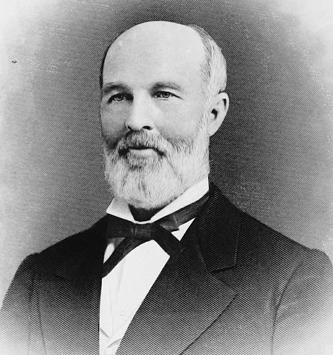Winston, Patrick Henry
9 May 1820–14 June 1886
 Patrick Henry Winston, lawyer and public official, was born in Franklin County, the son of George W. and Anne (Nancy) Fuller Winston. George Winston was a descendant of John Winston, uncle of Sarah Winston Henry, mother of the noted Patrick Henry. As a youth Patrick Henry Winston worked in the fields of his father's farm and studied under his mother's guidance. At age eighteen he entered Wake Forest College, where he completed three years of academic work in a single year. For the next three years he taught in Oak Grove Academy near Windsor, Bertie County, while continuing his own personal study. He then enrolled at Columbian University in Washington, D.C., from which he received an A.B. degree with highest honors. For a brief time Winston read law under Judge Robert B. Gilliam at Oxford before studying law at The University of North Carolina in 1844–45.
Patrick Henry Winston, lawyer and public official, was born in Franklin County, the son of George W. and Anne (Nancy) Fuller Winston. George Winston was a descendant of John Winston, uncle of Sarah Winston Henry, mother of the noted Patrick Henry. As a youth Patrick Henry Winston worked in the fields of his father's farm and studied under his mother's guidance. At age eighteen he entered Wake Forest College, where he completed three years of academic work in a single year. For the next three years he taught in Oak Grove Academy near Windsor, Bertie County, while continuing his own personal study. He then enrolled at Columbian University in Washington, D.C., from which he received an A.B. degree with highest honors. For a brief time Winston read law under Judge Robert B. Gilliam at Oxford before studying law at The University of North Carolina in 1844–45.
On New Year's Day 1846 he married Martha Elizabeth Bird of Bertie County, where the couple made their home. While establishing a law practice, Winston also taught school, but he soon gave that up as he came to be regarded as one of the foremost lawyers of northeastern North Carolina. In addition, he owned a number of plantations and operated fisheries on the Roanoke River.
In 1850 and 1854 he represented his county in the House of Commons. The General Assembly in 1861 named him one of the judges of the Court of Claims, and later Governor Zebulon B. Vance appointed him financial agent for North Carolina in fiscal relations with the Confederate government. In 1862, after Union forces occupied portions of eastern North Carolina, Winston acquired the 721-acre Springfield plantation on the Tar River in Franklin County and moved his family there for the duration of the Civil War. In 1864 he was president of the Council of State, and in 1865 he was the Franklin County delegate to the Constitutional Convention.
In the fall of 1865 the Winston family returned to their home, Windsor Castle, in the town of Windsor. The last three of the Winstons' ten children had been born while they lived at Springfield plantation in Franklin County. Patrick Winston resumed his legal practice and retired from politics. In 1868 he declined a nomination for the U.S. Congress, and in 1878 he did not pursue an opportunity to have his name submitted at the Democratic state convention for a seat on the North Carolina Supreme Court. He was in ill health for a number of years before his death in Windsor. He was buried in the churchyard of St. Thomas Episcopal Church, Windsor.
His five children who lived to adulthood were Patrick Henry, Jr., George Tayloe, Francis Donnell, Robert Watson, and Alice Capehart. Four others died in infancy and one at age three. The Winstons were noted for their learning and culture as well as for their sense of humor. Even near the end of the twentieth century funny stories by and about "Old Man Pat" Winston, as he was lovingly called, were still being related.
References:
Samuel A. Ashe, ed., Biographical History of North Carolina, vol. 2 (1905 [portrait]).
John L. Cheney, Jr., ed., North Carolina Government, 1585–1979 (1981).
Walter Clark, ed., Histories of the Several Regiments and Battalions from North Carolina in the Great War, vol. 1 (1901).
Daniel L. Grant, Alumni History of the University of North Carolina (1924).
Patricia Winston Norman (Flintridge, Calif.), personal contact, October 1981.
Additional Resources:
P. H. Winston Papers, 1848-1879, 1930, 1938 (collection no. 00963-z). The Southern Historical Collection. Louis Round Wilson Special Collections Library. University of North Carolina at Chapel Hill. http://www.lib.unc.edu/mss/inv/w/Winston,P.H.html (accessed March 27, 2013).
"'Windsor Castle'." N.C. Highway Historical Marker A-74, N.C. Office of Archives & History. https://www.ncdcr.gov/about/history/division-historical-resources/nc-highway-historical-marker-program/Markers.aspx?sp=Markers&k=Markers&sv=A-74 (accessed March 27, 2013).
"Presentation of the Portrait of Patrick Henry Winston to the Supreme Court of Nroth Carolina by his Excellency Lock Craig, March 31, 1914." Cases Argued and Determined in the Supreme Court of North Carolina 166 (1914). 666-676. http://books.google.com/books?id=5EJOAQAAIAAJ&lpg=PA665&ots=9TRxvBr7sC&pg=PA665#v=onepage&q&f=false (accessed March 27, 2013).
Winston, Robert Watson. It's A Far Cry. Henry Holt And Company. 1937. https://archive.org/details/itsafarcry011740mbp (accessed March 27, 2013).
Robert W. Winston Papers, 1826-1944 (collection no. 02369). The Southern Historical Collection. Louis Round Wilson Special Collections Library. University of North Carolina at Chapel Hill. http://www.lib.unc.edu/mss/inv/w/Winston,Robert_W.html (accessed March 27, 2013).
Patrick Henry Winston papers, 1848-1938, Bertie, Franklin, and Martin counties, North Carolina. Bethesda, MD: University Publications of America. 1992.
Image Credits:
"P.H. Winston." Biographical history of North Carolina from colonial times to the present. Greensboro, N.C. : C. L. Van Noppen. 1905. 441. https://archive.org/stream/cu31924092215445#page/n625/mode/2up (accessed March 27, 2013).
1 January 1996 | Powell, William S.